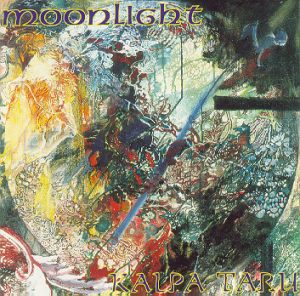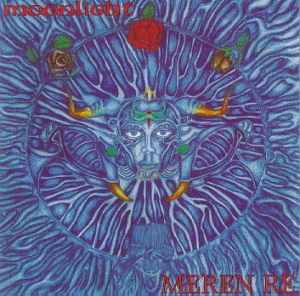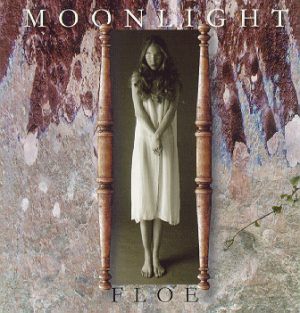Moonlight
female vocal fronted progressive metal
album reviews and artist reflections
Reviews and HTML © Russell W Elliot 2001
Images © Metal Mind Records 1996-2001
used with permission
formatted for 800 x 600 or larger windows
Last updated: 28 December 2001

click on image to visit the band's official website
Moonlight are a five-piece progressive metal ensemble from Poland. While full details of the band's background and operating locations at this initial writing are a bit sketchy, the band is clearly built around the lovely vocals of Maja Konarska. Daniel Potasz (keyboard), Andrewzej Kutys (guitar), Pawel Gotlas (bass) and Maciej Kazmierski (percussion) complete the lineup. The band have released five albums since their inception. Interested readers will want to check out Inermis (Reedycja) and their latest release Koncert W Trójce to gain a complete appreciation for the band's sound. This feature reviews three of Moonlight's albums and includes an interview with Maja and Andrewzej.
Listeners will be immediately drawn into Moonlight's music. Vocals are sweetly sung and heavenly in both gentle and agressive instrumental arrangements. The band's sound varies between heavy metal, symphonic/orchestral and more accessible rock sounds. An ethereal texture with a tinge of gothic arises from the Polish lyrics in some of the earlier material. Those that have enjoyed music by Centuria (review), Quidam (review, more), You And I (review) and Fanni Szomor (review) are likely to enjoy Moonlight's recordings.
Moonlight and Artrosis, both recommended to our editors by the president of Sonic Cathedral, are signed to Metal Mind Records (Poland). Our Artrosis feature--embracing almost their entire recorded output--will be completed in early 2002. Visitors can obtain autographed copies of both bands' albums from Sonic Cathedral.
 Kalpa Taru (MMP CD 0040) Image © 1996 Metal Mind Records |
Kalpa Taru. Released in 1996, Moonlight's debut album is comprised of fifteen tracks with varying styles but centred on symphonic somewhat metal-edged rock tunes sung entirely, like the rest of the band's catalog, in the Polish language. One can not help but get enthused about the band's sound from first listen of the opening almost spoken rocker "Strach." The artist's metal-edged roots come through in rhythmic guitar riffs but the melodic keys and sweet vocals break what could otherwise be called a heavy pattern. The band slow down in "Stadium Wiary," a melodic anthem with vocal layers being echoed by keyboard excursions. Brief spoken vocal parts in the bridge are enjoyable.
Andrewzej Kutys' guitar playing is featured in "Cisza Przed Burzq," a symphonically arranged, yet accessible, ballad, with many layers of sweetly sung vocals. It blends almost seamlessly into the gothically arranged "Extaza Milczenia" where the entire range of Maja's vocals are explored. We especially enjoyed the lush orchestral style arrangements in the stunning "Conquistador," the guitar solo during the bridge and the soaring vocalisations at the end of the piece.
The symphonic texture gives way to a harder edge in "Modlituso o Imitawanie," which continues to explore Maja's vocal range; the harmony layers work well in the more thickly arranged portions of the song which contrast the everso gentle verses. "Hexe" begins as a lighter jazz-oriented track but quickly builds to illustrate the full on metal energy with vast guitar excursions during the bridge. The contrasting backing vocal harmony is especially enjoyable.
Arrangements in the progressive rocker "Ananke" effectively balance orchestral keyboards with rhythmic guitar patterns. Vocal harmonies produce a rich texture with thick metal sounds during the robust chorus contrasting Maja's lead during the ballad-like verses. Devoid of any metal influences, the brief orchestral "Zmierzch" is one of the album's standout tracks and one that blends perfectly with the ballad-like verses of the otherwise fast-paced and delightful rocker "Damaisa." Maja's soaring lead vocal is tremendous.
"Msza" is a relatively hard piece that actually blends the softest of ballad-like arrangements with full-on instrumentals sounds, layers of harmony vocals and soaring vocal excursions that continue almost seamlessly into "Deformis," another one of the band's heavy metal pieces. The track "Zbrodnia I Kara" is a fast paced rocker with almost spoken vocals whilst "Belibaste" is a lovely, orchestrally light and gentle ballad-like number clearly showcasing the range and depth of Maja's vocal talent. This first album from Moonlight will attract new listeners but refined arrangements and a further development of the band's sound is evident in their next release.
 Meren Re (MMP CD 0049) Image © 1997 Metal Mind Records |
Meren Re. The second album by Moonlight is a thirteen track collection of stylistically varied symphonic progressive rock tracks. Some of the band's initial metal edges are subdued but the artists haven't completely let them go. The album opens with the fast paced symphonically arranged rocker "La Dance Macabre," which like other tracks on the album has some heavy metal riffs. Lush instrumentals support Maja's vocal lines which, as before are sometimes multi-tracked. "Melpomena" is one of the album's standout tracks; accessible with its rhythmic percussion, the string sounds perfectly compliment the full-on instrumentals and lead vocal lines.
The album drives on with the power of "Dies Irae (Dzien Sadu)." One can not help but notice the rich symphonic gothic textures used within the arrangements. The fast-paced romping rocker "Gora I Dol" has softer metal edges that blend well with swirling harmony layers of Maja's vocals. The quieter moments during the bridge allow th vocals and keyboards to emerge above the guitar riffs. The incredible tempo transitions, sweeping keyboard passages and lovely vocal lead within "Troche Pozniejsze Popoludnie" further illustrate the band's strengths. The contrasting and thickly arranged rocking segments are especially enjoyable. "To Co Za Drzwiami" follows on naturally extending the epic, picking up right where the preceding track has left off.
Similarly, the pair "Cha-Nefer-Meren-Re" and title track "Meren Re," work quite well together. They begin gently, drawing on gothic influences before opening into full-on instrumental power and a rapidfire rocking energy. "Meren Re" opens quietly but with a renewed emphasis on percussion. The pulse quickens as the epic develops with whispy vocal layers underscored by the band's symphonic instrumental power and classically influenced electric piano. A vocalise segment in the bridge is especially enjoyable.
The band's rocking energy in "Glosy" and progressive stylings in "Shahre Gholgtha (Miasto Krzyku)" are perfectly balanced with Maja's stunning vocal work. The former is slightly less accessible than the latter; soaring vocal excursions leading into the chorus and guitar solos during the bridges are tremendous. "Wiem" is a certain standout of this album, perfectly balancing the band's instrumental energy with Maja's lead and supporting harmonies. "Tu" is instrumentally more sparce and vocally lush while "Inter Sacrum," which concludes the album, is a symphonically styled progressive number and is one of its standouts. Our CD has a fourteenth bonus track, a radio edit of "Shahre Gholgtha." An album of lovely stylistic complexity, is certainly a wonderful development for the band. Our review of their latest album follows the interview.
The Interview
Shortly after receiving the band's albums for review and listening to them through we conducted a short but insightful interview with Moonlight's vocalist, Maja Konarska and guitar player Andrzej Kutys.
Musical Discoveries: Please tell me a little bit about your backgrounds prior to Moonlight.
Andrzej: The beginning of our band isn't very original. To tell you the truth, simply a few people who wanted to make music met together. Because none of us had experience with playing in the band, we all together learnt how to do it. Thanks to that our music changed and evolved. It also happened that way because during all of these years several different musicians, whose musical visions varied from each other, played in Moonlight and everyone of them had an influence on composing and final shape of recorded material. The latest personnel change took place not that long time ago and again it meant the new look at the songs and their climate.
We played a lot of concerts throughout Poland, released five studio albums and one with live material and these are the things that tell most about the history of the band.
What other artists interest you and why? Who do you find yourself listening to and how have they influenced you?
Andrzej: We are interested in many kinds of music. Sometimes our types, likes and dislikes are completely different from each other, so it is hard to say that there is one artist, who we all like in a same degree. The range of our interests is very wide: from jazz experiments to all kinds of metal.
 Maja Konarska Image © 2001 Metal Mind Records |
Maja, how did you develop your vocal style?
Maja: I think that my style of singing was created very spontaneously. If I only can I try not to listen to too much female vocalists, but of course time to time I use some vocal techniques characteristic for some particular singer. But I never try to sing like somebody else, rather based on someone's methods I try to develop my own style.
Moonlight is actually very varied in their style of music. What are some of your favourite tracks and why?
Maja: It is really very hard to indicate a few chosen songs. It changes. I guess, that we like them all, only sometimes one of us likes one particular song more than the others. You know, even if I told you my types now in half a year they could be completely different.
Please explain the various sequences you go through when writing your music.
Andrzej: It happens something like this. We usually work together. During the rehearsal someone brings a new idea and than all of us sit together and try to arrange it in a best way. Then Maja composes melodic lines for finished arrangements.
Only the work on the latest album (Yaishi) was a bit different. Just a few songs were finished, the rest was just a sketch. So the goal of our producer (Marcin Bors) was to complete everything to fit his vision of the album he had in his head. We trusted him in 100% and it was a good choice, now we are very pleased. Because we wanted someone from outside to take a look at our music - Marcin was a perfect choice. He worked with us during the recording of the previous album (Floe), but because of the lack of time, he couldn't have such an influence on our sound like with the latest album.
All of our albums are recorded in the same studio, only the producers are different. Now Marcin is our producer and we are sure to cooperate with him in the future.
Do you have careers or work outside music? I'd be interested to know the kinds of things you do if this can be shared.
Andrzej: We all work or study, because we are unable to live only from our music. This is a specification of the Polish music market. I work for a radio, Daniel runs a studio dedicated to recording commercials, Michal is still studying and Maja lends her voice for some commercial recordings too.
What inspires the lyrics of your songs?
Maja: The lyrics are always written under some strong emotions and personal considerations. We don't have ambition to give salvation to the world. But the lyrics in our songs tell the stories about human emotions, feelings, about relations between people.
Is there a lot of interest in your music from countries that speak a different language to your native tongue?
Maja: We receive a lot of signals from foreign countries, even from Philippines or others very exotic countries for us, so it seems that our music interests people in various countries, not only in Poland. We played a few concerts in Germany and what was interesting about that we sang in Polish but nobody bothered about that. We also recorded an English version of Yaishi, but the promotion beyond Polish borders doesn't belong to us, and it seems that our recording company neglected that matter.
Has the internet influenced your musical career and the promotion of your music?
Andrzej: Thanks to the internet people interested in Moonlight have an opportunity to get in touch with us in a much easier way. Our songs are quite seldom played on the radio or in TV. So thanks to the internet it is much faster for the fans to get to know where we will play our next gig or what we are currently recording.
Tell us about your live performances.
Maja: We like to play gigs a lot. And according to our fans we can do it in a quite good way. But of course it is hard for me to answer such a question. We played as a support for King Diamond, Megadeth, Pendragon and it for sure gave us a better understanding of a big stages and big events. We also played a few concerts for TV, so everyone could watch us there.
And what about your future? What's next for Moonlight?
Andrzej: It is very hard to tell you that now. Simply, after some rest we will start to compose new songs.
 Floe (MMPCD 0092) Image © 2000 Metal Mind Records |
Floe. Our compact disc is the limited edition that includes three bonus tracks and a video. The bonus tracks are "List Z Raju," "Tantec Ze Smiercia" and "Meren Re (Dobranoc)." The videoclip is of "List Z Raju." The compact disc is comprised of these four plus the nine tracks included on the standard edition.
We are informed that the band's style changed in the two albums that were made after Meren Re but that the style reverted for Floe; the album certainly picks up right where Meren Re leaves off. The opening number "Tabu" is a richly symphonic but equally metal-edged rocker. Gothic overtones also shine through the layers of Maja's vocals. We especially enjoyed Maja's vocal clarity in the ballad-style track "Lekarstwo Na Sen." Led by the melodies of rich electric guitar, Maja's vocals shine in the melodic ballad and album standout "List Z Raju."
The heavy rocker "Taniec Ze Smiercia" alternates between an almost-spoken vocal line and some tremendous guitar playing. A gentler keyboard instrumental supporting the verse provides a lovely contrast to the ripping instrumentals of the chorus. An everso emotionally sung "Meren Re (Akt Ostatni)" is sung over a very light instrumental whilst the track "Meren Re (Dobranoc)" that follows features a lusher and somewhat more orchestral arrangement with a substantially denser rhythm section supporting the album's standout ballad.
The seventh track on the album is un-named on our compact disc; on the band's website it is listed merely as "...". It's a warmly arranged gothic instrumental, rich with percussion and vast excursions of Maja's (middle-eastern sounding) vocalise. The thickly arranged lush progressive metal rocker "Obsesja" follows quite naturally. Layers of vocals blend wonderfully with metal sounds and the gothic / middle-eastern style instrumental arrangement. The transformation continues with "Shadizar"; again lush gothic style arrangements dominate the instrumental foundation of this signature ballad. Maja's evocative lead vocal is substantially sung without harmony layers.
"Kiedy Mysel Mi Oddasz" is certainly one of the album's standouts. Sung evocatively as a ballad with symphonic keyboard-based arrangements, it shares the gothic texture that develops as this album plays from the middle towards its end. Just to make sure that the listener doesn't forget Moonlight's background, "Kochanka" picks up the pace mixing heavy metal with gothic overtones. It's a unique style--and it works well. The album's final piece, "Nic W Zyciu Nie Dzarza Sie Przypadkowo" is actually a "hidden" track and is a gentle lullaby sung without instrumental support.
Moonlight's albums are certain to appeal to enthusiasts of progressive metal-edged music with female vocals. The band have evolved over the three albums reviewed above blending symphonic and orchestral textures with Maja's lovely vocal talent. You can order the albums from Sonic Cathedral online.
Return to website contents